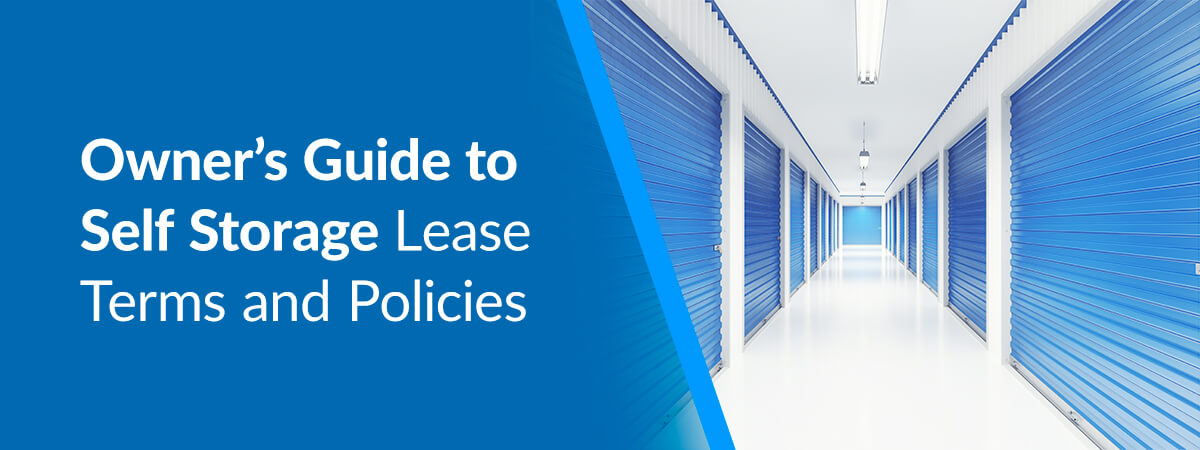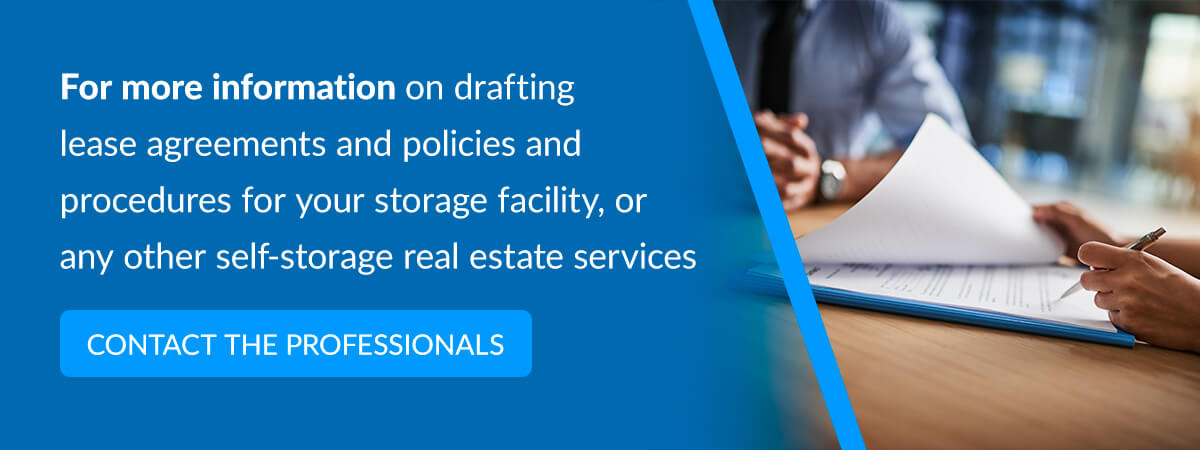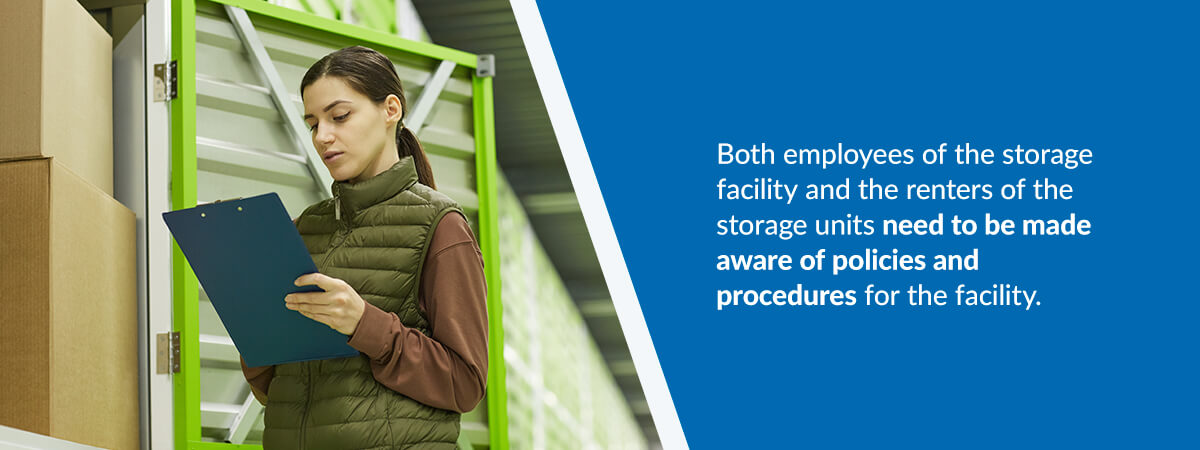Owner’s Guide to Self Storage Lease Terms and Policies

Crafting well-written and established lease terms and policies for self-storage facilities is vital for keeping your storage operations running smoothly and ensuring the best business outcomes possible. Drafting a storage facility manual or lease shouldn’t be a one-and-done process. It is important to periodically review your current storage rental terms in order to keep them up-to-date and relevant as technology advances and your operating procedures evolve.
However, it can be overwhelming to know what to include and how to properly formulate your storage lease agreements and procedures. Storage lease terms and policies should be detailed enough to equip your business to operate successfully while keeping both tenants and owners well informed.
Why Are Storage Lease Agreements and Facility Policies Necessary?
When drafting a self-storage lease, one of the main considerations is to establish the owner’s relationship with the client as tenant and landlord. Liability is much stricter in situations where an owner is not explicitly recognized as a landlord, putting a burden on the owner to properly care for and protect the items within the storage unit.
Storage lease terms where the owner is established as a landlord in the agreement mean that the responsibility to care for the goods being stored by the tenant is their own, not that of the landlord. This stipulation places less liability and pressure on the owner.
Storage lease agreements and facility policies provide instruction and guidelines for both the tenant and the landlord of the storage unit. These agreements and facility policies provide transparent information to both parties about what is expected during the duration of the lease and who carries the burden of different circumstances that may occur during the lease terms.
Facility policies also create a standard operating procedure that protects and respects both the tenant and the landlord. Establishing well-written lease agreements and facility policies allows for a better relationship between the client and the owner and protects the owner from negative outcomes resulting from poor storage operations.
What’s the Difference Between Lease Agreements and Policies and Procedures?
Lease agreements and policies and procedures often go hand-in-hand — however, they are separate documents with different goals and need to be formulated differently to achieve those goals.
Storage Facility Policies and Procedures
Policies and procedures for storage facilities are similar to a manual that should be followed by the owner and employees as well as the tenants occupying the storage space. These policies and procedures address things like maintenance, operations and customer service.
The storage facility policies could include operating procedures for how often HVAC systems need to be cleaned, who to contact for questions or concerns about the storage space and the processes for handling delinquent or out-of-hand tenants. The policies and procedures are not legally binding documents, but they serve the purpose of outlining how operations should be conducted.
Policies and procedures provided to employees and tenants may need to include different information, but both parties should be well informed on how business is conducted and the policies and procedures should be transparent and consistent for everyone involved.
Storage Facility Lease Agreements
The lease agreement is a legally binding document between the owner of a storage facility and the tenant occupying the storage space. Unlike the policies and procedures, the lease agreement is the same for both parties and gives detailed explanations on the liabilities and responsibilities of both the landlord and the tenant.
You can write your own storage facility lease terms, but it is important to draft lease agreements that are well informed and legally sound. Getting a licensed attorney to review the document before it is signed can provide peace of mind that the lease terms are appropriate and provide proper protection, especially because the lease will be essential in any cases that must go to court.
What You Should Include in a Self-Storage Lease Agreement
To ensure you cover some of the most important topics, check out the following items to include in your storage facility lease agreement:
Limitation of Liability
Depending on the state in which you draft the lease agreement, there may be special release of liability provisions that protect the landlord in case an event damages the goods within a storage unit. Lease agreements and facility policies that protect the owner in this way include limiting the value within the unit, discouraging the storage of special or sentimental items and disallowing the right to a jury trial.
By adding these provisions into a lease agreement, a storage facility owner decreases the burden of being held responsible for emotional distress if extremely valuable or sentimental items are damaged while within the storage unit. It also gives the storage unit landlord a chance for a lesser verdict because they are not facing a jury trial.
Storage Security
Be sure to include that storage is at the risk of the tenant. You must include this in the lease agreement to free yourself from the responsibility of securing and maintaining the integrity of the items stored. Make sure that it is clear to tenants that you are not responsible for lost, stolen or damaged items.
You can also reference that any on-site security measures are not for monitoring the safety of the goods in storage, but are in place for the safety of the employees and the facility.
Insurance
Another consideration to make known within the lease agreement is that the tenant should provide the insurance for the stored items. This releases the responsibility of the owner to have insurance on the goods and helps to remind tenants to limit the value of the goods they store within the facility.
Other Important Items to Include in a Storage Rental Lease Agreement
Some other stipulations you may include in the lease agreement include:
- The banning of storing or using hazardous substances.
- Defining the rate change and termination guidelines.
- Outlining the grounds for and situations when the landlord can enter a storage unit.
- Disallowing the right of the tenant to sublease or share the unit without landlord approval.
- Defining the use of the term “climate controlled” and noting that humidity cannot be controlled.
What to Include in Your Storage Facility Policies and Procedures
Both employees of the storage facility and the renters of the storage units need to be made aware of policies and procedures for the facility.
Storage Facility Policies and Procedures for Employees
To ensure the safety and efficiency of your operations, notify employees of policies like:
- What to do in case of an emergency.
- How to properly accept and file payment and paperwork.
- How to handle maintenance.
- Procedures for tenants moving in as well as moving out of units.
- What to do in the case of a deceased tenant.
- Lien and auction processes for storage units.
You may want to post this policies and procedures document in the breakroom or another area visible for staff.
Storage Facility Policies and Procedures for Renters
Renters should also receive a copy of the policies and procedures as they relate to their use of the facility, including:
- How to submit maintenance requests.
- Any holidays the facility is closed.
- Who to call in case of an emergency.
- Where to submit payment and required documentation.
- Rules of the property.
- How to settle a complaint or dispute.
You may have them sign a copy of this document and retain one for your records in the event any disputes come about.
Self-Storage Real Estate Services
Writing thorough lease agreements and policies and procedures for your storage facility is imperative to ensure you have sufficient legal protection. They also offer transparency about your operations to both employees and renters.
Detailed documentation will ensure that your storage facility runs smoothly. For more information on drafting lease agreements and policies and procedures for your storage facility, or any other self-storage real estate services, contact the professionals at Investment Real Estate, LLC.



